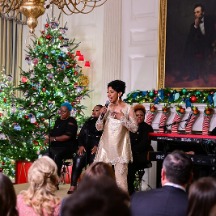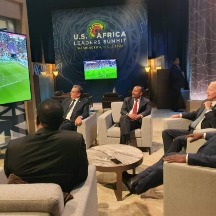“Look, this forum is about building connections. It’s about closing deals. And above all, it’s about the future, our shared future,” United States President Joe Biden told African leaders in mid-December at the historic US Africa Leaders Summit 2022.
Delegations from all 49 invited African countries and the African Union (AU), alongside members of civil society and the private sector attended the Summit in Washington. We interviewed representatives of two countries not invited, the Sahrawi Arab Democratic Republic and Mali, to get insights on their situations that may have led to their not being invited and what they felt they missed by not being at the table.
Somaliland, like the Sahrawi Arab Democratic Republic, was also not invited because their status as a nation is unsettled to many. The United States also did not invite delegations from Guinea, Sudan, and Burkina Faso, who like Mali, have changed governments unconstitutionally and were suspended from the African Union; therefore, not invited. The U.S. did not invite Eritrea because the two lack formal ties.
Port of Harlem also talked with, African Human Rights advocate Khataza Gondwe, who is critical of such gatherings “since heads of state from other geographical regions generally are invited for individual state visits while those from Africa are ‘rounded up like cattle’ for ‘moments’ with their US counterpart.”
The London-based advocate said that if she was advising African heads of state, she “would tell them not to attend this meeting or the one convened in China, and instead ask both heads of state to visit an AU heads of state gathering in Africa.”
Sahrawi Arab Democratic Republic Not Invited
The Sahrawi Arab Democratic Republic (SADR)
recently fell victim to an Israel-United States-Morocco deal. In exchange for Morocco normalizing relations with Israel, on December 11, 2020, the United States recognized Morocco's claim over SADR, also known as Western Sahara. While the Trump administration was touting this agreement as an achievement, The AU maintains that the fate of Western Sahara be decided by a referendum - - not by the United States.
The AU maintains its support for the self-determination of Western Sahara through a free and fair referendum as decided by the UN Security Council says Ebba Kalondo, spokesperson of AU Commission chair Moussa Faki Mahamat.
Though SADR is a member of the AU, when Port of Harlem asked for the reasons for the non-invitation, Dana Banks, Special Assistant to the President and Special Advisor for the U.S. Africa Leaders’ Summit, National Security Council, was diplomatically unclear.
The representative of the SADR Mouloud Said told Port of Harlem that he wasn't expecting an invitation since the meeting was not an AU meeting; so he had no expectations. Nevertheless, the unofficial diplomat said, “the struggle continues.”
However, Bill Fletcher, Jr., veteran American activist and co-coordinator of the
Campaign to End the Moroccan Occupation of the Western Sahara, took a sharper view. He says the real reason why the United States did not invite SADR was that it did not want to “offend” Morocco. However, he added, SADR’s absence was a missed opportunity for the US government to learn “that regional peace and security in Northwest Africa necessitates a just solution of the Sahrawi struggle.”
The American based campaign plans to continue to build awareness and a constituency for SADR among the general population and Congress. We aim “to put pressure on Congress not to sell Morocco weapons that could be used against the Sahrawis and to get the Biden administration to reverse Trump’s illegal recognition of the Moroccan annexation of SADR,” added Fletcher.
Somaliland, Is It a Country?
Joshua Meservey, senior policy analyst at the Heritage Foundation, advocated in a policy paper that the United States recognize Somaliland as an independent state. “Meservey recounts that Somaliland ended its voluntary union with the Somalia Republic in May 1991 and has been governing itself successfully for 30 years,”
reports Stephen M. Schwartz, who served as the first U.S. Ambassador to neighboring Somalia. The Heritage Foundation is a conservative American think tank.
Somaliland was known as British Somaliland until independence in 1960. The government of Somaliland regards itself as the successor state to British Somaliland. The new State of Somaliland united in 1960 with the Trust Territory of Somaliland (the former Italian Somaliland) to form the Somali Republic.
Kenya’s Martin Kimani echoed this sentiment when his country voted to condemn Russia for invading Ukraine.
One reason African countries may find it hard to recognize nation status for Somaliland is the general agreement by the AU that the continent's colonial borders should not be changed. Otherwise, it could lead to unpredictable secessions on the rest of the continent.
Kenya’s Martin Kimani echoed this sentiment when his country voted to condemn Russia for invading Ukraine reported National Public Radio. He pointed out that Africa itself has had to contend with borders created by colonial powers because of the greater goal of peace. “Rather than form nations that looked ever backward into history with a dangerous nostalgia, we chose to look forward to a greatness none of our many nations and peoples had ever known.”
He continued, “We chose to follow the rules of the OAU (Organization of African Unity - now the African Union) and the United Nations charter not because our borders satisfied us but because we wanted something greater forged in peace.”
Mali Not Invited
Not only has Mali suffered several coups, the land locked country is also experiencing a civil war. Tuareg and Arab groups in the sparsely populated, possibly oil-rich north have attempted to gain autonomy for the region they named Azawad. The conflict has even included discord between allies such as between the Tuaregs and Islamists and between the French and the Malian government.
The conflict has affected historic Timbuktu in North Mali. Locals claim that before being pushed back, Islamist imposed their rigid interpretation of Islam on the city's residents and destroyed many cultural and historic sites, include the mausoleums of saints.
Alimata Coulibaly, who is from Bamako, in South Mali, attended the US Africa Summit, but her country’s not-invited status limited her access to business meetings. “I could not attend certain business meetings, such as the meeting the US government had with private sector business leaders,” she told Port of Harlem.
Her company,
Maverick Global Management Consulting, provides development and humanitarian project management services in West Africa, including Mali. “It is difficult,” she added about attracting investors to her birth country, “because we don’t have enough investors who want to invest there because of the conflicts.”
At the Summit he continued the call for Africa’s inclusion. “And, today I’m also calling for the African Union to join the G20 as a permanent member of the G20,” the former Delaware Senator said.
Moving Forward – Agenda 2063
The Biden Administration seemed to have navigated the unsettling African political waters unscathed, as the president made it clear that the United States of America was back after four years of his predecessor’s policy of being an uninvolved neighbor.
While remembering “the stolen men and women and children who were brought to our shores in chains, subjected to unimaginable cruelty,” Biden also owned that “my nation’s original sin was that period.” During the Summit, Biden also looked forward and embraced
Agenda 2063—the African Union’s strategic vision for the continent.
A part of Agenda 2063 is the recognition of the sixth region consisting of Africans in the diaspora which Biden matched with his vision that one advantage America has over its Chinese and Russian rivals is its large African American population, including newly arrived Africans.
“I also directed the establishment of the President’s
Advisory Council on African Diaspora Engagement in the United States so we can tap the enormous strength of the diaspora communities here in the United States and make sure their insight and experiences are reflected in our work,” continued the President.
Biden appointed career Ambassador Johnnie Carson to oversee implementation coming out of the summit. Carson is also of African descent will serve as
Special Presidential Representative for U.S.-Africa Leaders Summit Implementation.
The president’s progressive agenda and appointments are not his first. As Barack Obama’s running mate, he helped elect the nation’s first Kenyan-American president and by selecting and winning his own presidency with Kamala Harris as his vice president, he made history again with the nation’s first female, African, Asian, and Historically Black College and University graduate US Vice President.
Moving Forward - Biden’s Game Changing Proposals
In September, at the United Nations General Assembly, Biden called for reforming the U.N. Security Council to include permanent representation for Africa. At the Summit he continued the call for Africa’s inclusion. “And, today I’m also calling for the African Union to join the G20 as a permanent member of the G20,” the former Delaware senator said.
“At least something decent came out of this wretched gathering,” added Gondwe from her London base. “Biden has redeemed himself and rescued the entire conference, and if he puts these words into action, it will cover a multitude of sins.”
Coming:
A conversation on the role of diaspora remittances in the future of Africa continues March 22-24,2023, at the upcoming
8th African Diaspora Investment Symposium (ADIS) in Silicon Valley and hosted by the African Diaspora Network.
We Talk Radio: Thu, Dec 29, 10a
Kymone Tecumseh Freeman talks with Wayne Young about the US Africa Leaders' Summit and its importance to the African world.








